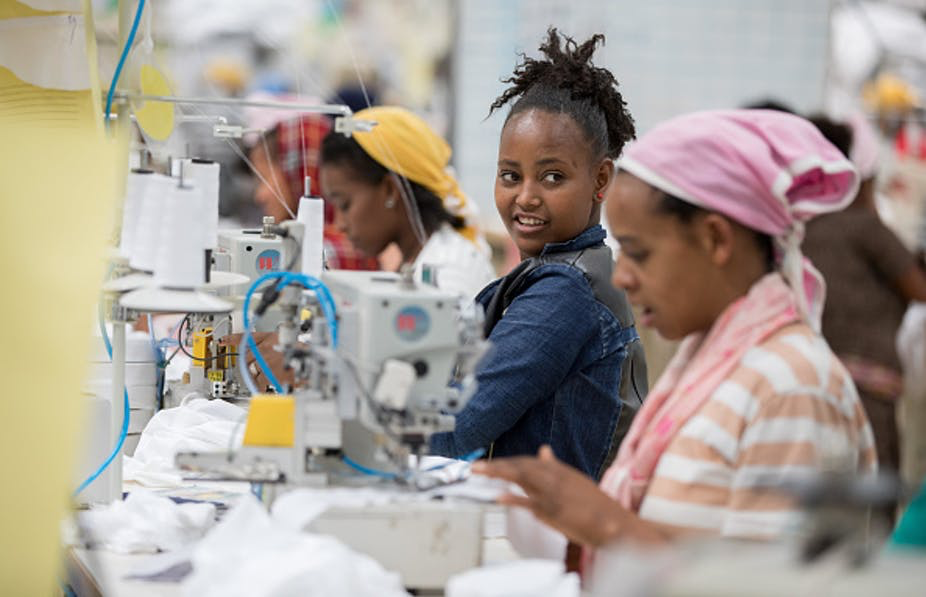Published: February 23,2022
By Weiwei Chen

Women workers sow children’s underwear at a textile factory in Addis Abeba, Ethiopia. Photo by Kay LinkedIn
Common perceptions about Chinese engagement in Africa are that it is one-dimensional and sometimes biased. One common problem with this perception is the seeming acceptance of what’s called ‘methodological nationalism’ – that the national origin of a firm or agency determines outcomes.
In her book The Specter of Global China, sociology professor Ching Kwan Lee points out that:
popular discourse and consciousness do not distinguish between state and private Chinese investors, who were all lumped together as ‘Chinese companies’.
Meanwhile, Africa, a continent with 54 officially recognised states, has often been portrayed as a fragile, vulnerable single entity that has been exploited by China.
In reality, neither the Chinese state nor Chinese businesses can be thought of as homogeneous. As professors Marcus Power, Giles Mohan and May Mullins have emphasised China–Africa relations and interactions are no longer entirely directed by the Chinese.
The way Chinese firms behave in foreign countries largely depends on their local improvisation and ability to bargain with host country states. This is particularly true in the least developing economies.
Despite rampant groundless scepticism, little concrete evidence is available to support or disprove critics. Many questions on investment, aid, employment, governance, companies, sector dynamics and security, among other topics, cannot be answered on the basis of rumours or rapid appraisals.
My PhD research focused on a comparison of the light manufacturing industry and the construction material industry in Ethiopia.
I argue that far from constituting a homogeneous and static group, Chinese private investments in Ethiopia are highly diverse, fluid and complex. Motives and determinants of these firms to invest in Ethiopia differ significantly. This is true both across sectors as well as within the same sector (or same market).
My research shows that there are two other important variables that explain variations. The first is the type of firm (in terms of scale, history and origin of investment). The second is the entrepreneur’s background. This includes family and educational background, business experience and guanxi (connections and relationships).
Context is also key. Both China’s and Ethiopia’s political economy conditions have, to a certain extent, contributed to ‘push’ and ‘pull’ Chinese private firms to invest in Ethiopia. This includes government policies and institutional context at national and sub-national levels.
My findings bring in new field-based evidence that challenges common perceptions. Examples include the supposedly dominant role of state-owned enterprises in Chinese investment in Ethiopia. The findings add evidence to a growing body of research that dismantles the assumption that national origin of investors determines outcomes.
In addition, Ethiopia’s case has profound implications for other African countries. It has, to a certain extent,my research refutes the assertion that African countries are passive or impotent when it comes to outward foreign direct investment. It demonstrates that a landlocked country with limited natural resources can achieve rapid industrialisation and economic growth through proactive industrial policies and committed government.
Common perceptions debunked
My research finds that the Chinese private sector plays a dominant role in manufacturing investment in Ethiopia. This is true by the number of projects and as well as by value.
Dr Weiwei Chen works in the Department of Development Studies at SOAS,University of London. She is affiliated with Royal African Society. Previously, Weiwei was affiliated with the Ethiopian Investment Commission (EIC) as the Chinese Investment Advisor between Oct 2017 and Sep 2018, and the UNU-WIDER as the PhD Fellow (2019).
The Conversation
 Africa -China Review Africa -China Cooperation and Transformation
Africa -China Review Africa -China Cooperation and Transformation
